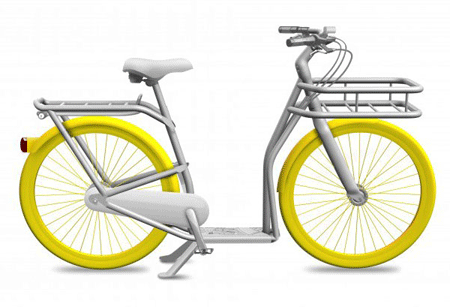Over the past six months I’ve thought a lot about a new type of retail shop. You know how all bike shops are supposed to be “about great service”? I’ve been wondering what would happen in the world of on-line retail, if we redefined that whole relationship between “store” and “customer” to better suit today’s consumer. In other words, can we build the store around the modern consumer. Literally.
To do it, we’d have to figure out what a consumer looks like these days. No small feat, because the definition is changing so rapidly. The blog photographer Jason Lee created for his daughters is pretty wonderful across the board, but this “cookie monster” image might just also happen to be one of the greatest comments ever about identity in the 21st Century. “Interactive” is one of those buzzwords that gets kicked around a lot in development and marketing circles, but I think Lee’s photo is a quiet little statement about where we’re headed as consumers. Despite not having any clear idea how it will look, or where it’ll originate, everyone–and I mean everyone–is looking for something called “social commerce” to be the Next Big Thing. I think–and hope–it’s going to look a bit like this photo.
What the hell does that mean? Well, partly it just means that it’s no longer any fun to support a company that doesn’t support us back. Still blurry, I know, but if I had a highly specific description of “social commerce” to offer, I’d be engaged in some yacht crash derby with young Mr. Zuckerberg this morning, and, having paid Salman Rushdie to write today’s post in my absence, would be subjecting you to some genuinely intelligent commentary about the state of the world. As it is, you have me, showing you bitchin’ Cookie Monster photos.
But we do know the future is going to be about each of us–or some such over-simplification. Already we’re seeing the down sides, including the political ramifications of each of us having our own separate and incompatible red or blue echo-chamber version of reality. (Which reminds me, I need to rewind my Glenn Beck “Time to Buy New Gold Coins and Guns Because We Have a Black President”-edition combination water purifier and Rapture-Watch™ alarm clock. My friends at Goldmine have a great price on some super-rare, chocolate-centered gold coins I can purchase right now as a hedge against Mayan end time currency devaluation.) There’s also the chaos that tends to follow from listening only to those who reinforce the really stupid voices in your head, but on the other side of all this deafening feedback, there could be some music. The only logical extension of where we’re headed is full personalization of the web, including each and every one of us:
- Realizing we’re responsible for our opinions
- Realizing those opinions are now commodities
- Taking an active role in marketing those commodities ourselves
- Knowing if we don’t, somebody else will be doing it for us
I’ve mentioned before that I’ve never understood why corporate Facebook pages would have “fans” or why people would bother to “like” Coca-Cola, but of course that’s not entirely true. People like these brands to connect with other people who also like the brands. The brand itself is just the umbrella. And while I still think “me-tooing” something as enormous and bland as Coke or McDonald’s makes even less sense than liking “breathing” or “the sun,” letting people connect over more meaningful brands makes a lot of sense.
That’s a fair chunk of philosophical pondering to boil down to this: if somebody started an on-line bike shop and let visitors make money selling the products, would people do it? I’ve been thinking about this for a long time now, and it seems to me that we’re not going to have “social commerce” until people have a vested interest, not just in the buying process, but also the selling. I can’t figure out why nobody has yet crowdsourced sales.
One answer might be that sharing your own opinions about stuff is easy, but curating a mash of those opinions is hard. While we’re all interested in getting in on things, sometimes none of us what to be a part of what all those separate opinions and ideas produce. Consider the new town bike concept, designed by Philippe Stark, a designer who “has applied his talents to products as diverse as a lemon squeezer and the Virgin Galactic Spaceship,”, not to mention the fugliest goddamn motorcycle I have every personally seen:
Yes, Mr. Stark has turned his attention to the urban bicycle.
According to this article, sponsored by a company selling bike riding insurance in the UK (which surely needs it), Stark “distilled” the opinions of three hundred people from Bordeaux, a city in which, , “ten per cent of trips are undertaken by bicycle,” (which frankly seems low for a European city) to create the “City PIBAL Streamer – a concept that allows the rider to sit and pedal in the conventional way, or stand on a platform and use like a scooter.” Here is the result of that collaboration.
Maybe I’m being a little hard on Bordeaux, but of the horrors 300 people are capable of producing, I’m pretty sure this is the most gruesome accomplishment yet. As such, Peugeot has agreed to do the manufacturing. I’m not entirely sure what occurs in Bordeaux that requires augmenting a basic commuting bike with some of the sweet design features of a Razor scooter, but it’s obvious Mr. Stark and his 300 Bordeauxians have given the world something . . . else.
No doubt we’ll be seeing some interesting new social business models in the next six months, but the problem with crowdsourcing will still the crowd.



